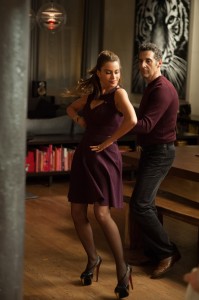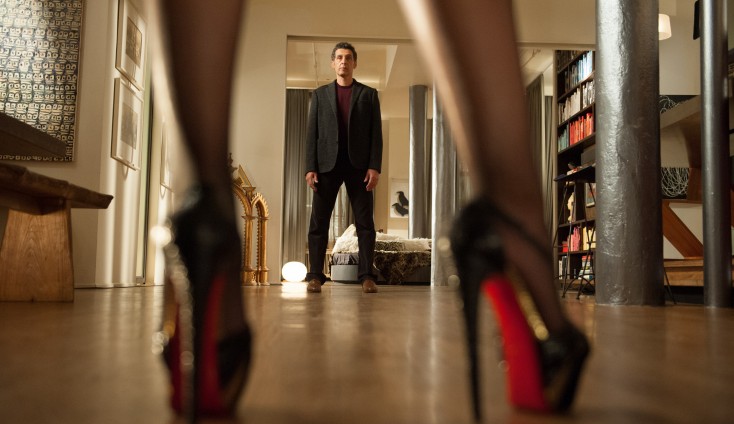
Sofia Vergara as “Selima” and John Turturro as “Fioravante” in FADING GIGOLO. ©Millennium Entertainment. CR: Jojo Whilden.
By ANGELA DAWSON
Front Row Features
HOLLYWOOD—John Turturro has delivered some memorable performances in films such as the Coen Brothers’ “Barton Fink” and “The Big Lebowski,” and Spike Lee’s “Mo Better Blues” and “Jungle Fever,” among his dozens of film, TV and stage roles. He studied drama at Yale’s prestigious drama school and has won an Obie and a Theater World Award for his debut performance in “Danny and the Deep Blue Sea.” But he also is an accomplished filmmaker, with five feature credits to his name, including the new comedy “Fading Gigolo,” which he wrote and stars in.
While the gangly, middle-aged actor might seem an unlikely casting choice to play a man whom women who look like Sofia Vergara and Sharon Stone would pay good money to sleep with, Turturro insists it’s actually quite plausible.
“Sexuality comes in all sizes, shapes, hairdos and colors,” he says during a recent stop here to promote the movie, which is gradually rolling out across the country. “I thought that was interesting, because sometimes you meet someone and maybe they’re not really at all beautiful, but they’re very attractive in some way.”
Turturro plays Fioravante, an unassuming New York florist, who has a certain hypnotic charm that makes him irresistible to women. Part of his success with the ladies is that he listens to them and does things that endear him to them. When his friend loses his bookstore and is in need of income, he proposes to Fioravante that they go into business together, as a pimp and gigolo. Vergara and Stone play lovelorn friends who consider Fioravante for a three-way and, at the same time, Fioravante woos a widowed Chasidic mother (French actress Vanessa Paris), who, despite living in a very cloistered community, is yearning to experience something new.
Fioravante’s friend, Murray, is played by none other than legendary filmmaker/actor Woody Allen, who delivers another memorable performance as a character who gets into something where he is in way over his head. Allen also served as Turturro’s sounding board while he was writing his script.
Turturro, 57, explains that it was a privilege to work with the Oscar-winner, both on-screen and off. During their collaboration, Allen even agreed to contribute a one-act play to Turturro’s staging of “Relatively Speaking” (which also included single acts written by Ethan Coen and Elaine May) on Broadway.
Q: Your film’s ostensibly about a male prostitute, but it’s also about relationships and connections.
Turturro: I kind of used the prostitution angle, and even a religious angle, as a metaphor. Why do people do those things? Why do people pay for sex? Why have people paid for sex for such a long time? It’s one of the oldest jobs. Actresses in the theater in the 1800s weren’t actresses; they were courtesans. Sarah Bernhardt was a courtesan. As a matter of fact, the intermission was so long in the theater back then because sometimes someone would see an actress on stage and they would have an encounter during the intermission. So I’ve always been interested in the subject matter. There have been some fascinating films over the years about it. “Nights of Cabiria” is one of my favorite movies (and) “Midnight Cowboy,” obviously.
Q: Talk about your involvement with Woody Allen.
Turturro: He and I were talking about how we could be good together in a film. And the subject came up maybe we could be in the sex business. Woody was like “Yeah, this could be perfect for us.” Maybe we were getting into the business, or maybe we were getting out of it because of circumstances, but we would be an unlikely pair. And then, I started thinking about friends my age who still live by themselves. I thought it would be interesting especially if it’s a guy who’s very comfortable with women and likes them. I thought, “That’s something that I’m comfortable with, in that situation.” Whether it’s my relationship with my mother, or my wife, or the woman that was the costume designer on the film. I also like the idea of a guy that is a physical person, who could do physical things like take an engine apart or make a meal or remembered to bring flowers, and who wasn’t a salesman. He wouldn’t be an ambitious person that you don’t see a lot in a movie, but he is very very competent and lonely, and he’s interacting with all of these women who are lonely for different reasons. Also, I thought about the idea of beauty. What do people associate with beauty? What is beautiful vs. sexy?
Q: Vanessa Paridis’ sexually naïve character, Avigal, is quite a contrast from Sharon Stone and Sofia Vergara’s sexually liberated characters.
Turturro: Yeah, but even Sharon’s character is kind of imprisoned in her rich world, but in a different way. So you want to have a balance. These are things that interested me. I’m interested in relationships, and the idea that everyone can be lonely, even if they are in a relationship. Sometimes people go outside for adventure, or something else. That’s an unceasing need throughout life, whatever age you are. You’re this age now, but seven years from now you could have lost someone, and you have to remake yourself. You’re still looking for someone to connect with, or to be with in the dark. That’s part of our life, besides warmth, safety and food. Woody encouraged me to delve deeper, because originally my idea was very broad and crazy. I had a lot of great ideas but they weren’t working in conjunction with one another.
Q: What was your original idea?
Turturro: One of the first ideas, which I loved, and I held onto for a long time, and regretted not being able to use was that I had this character for (veteran Broadway actress) Elaine Stritch. I’ve done a play with her and I directed her in “Romance & Cigarettes.” She went to Catholic school, and I knew I wanted a religion to use in this movie. I like anything about religion because you can’t have sex without religion. It’s impossible. So my idea originally was to have Elaine play a nun who was a virgin, who wanted to have sex before she died. Then, when she does, she’s really disappointed. She’s like, “That’s it? That’s the whole thing?”
Q: So, obviously your idea of this innocent older woman changed when you cast Vanessa Paradis as a young widowed Chasidic woman, right?
Turturro: Sometimes you have a great image, and then that filters into the character. With Vanessa, I feel so fortunate to have cast her. She has this gracefulness and delicacy. She made it into a character that almost went beyond the movie. It’s one of those characters where once you finish editing the movie, you wonder what’s going to happen to her? I really care about her. We stumbled onto something that’s real, a big part of life, even though it’s explained this way. Sometimes, in comedy, if it’s not silly, and it’s not sentimental, you can actually stumble onto something poignant. It’s a fine balance.
Q: How was it directing Woody?
Turturro: Woody was so easy. Not that anyone was really difficult, but Woody and Vanessa were so easy. They made the film possible, because it was such a tight schedule. We wanted to light it beautifully. We really had to be prepared, and if someone took too long in makeup, it really hurt us.
Q: What kind of notes did Woody give to you while working on the script?
Turturro: He gave me brutal notes about things that he didn’t think were believable. He’d say, “I like this part, but what about this?” and I kept coming back with changes. He saw that I could withstand his brutality and his criticism. He liked me enough, and I liked him enough to consider what he said. If it were somebody else I would have said, “Forget it! I’m going to go somewhere else.” You’re always learning. I’m still learning too, so maybe I could learn something from him. I think he really admired that, which is why he asked me to direct his play in the middle of it. He always liked the way I had written his character. His voice is in my head. I have enough material that I could easily do a sequel.
Q: What’s been the reaction of the Chasidic community to this movie?
Turturro: The reaction has been none. The Chasidic community doesn’t go to the movies. We opened it at the Berlin Jewish Film Festival. The reaction has been strong. I also tried to be balanced on making fun of everything. Nothing is invented. Maybe it’s a little exceptional here and there, but it’s not invented.





